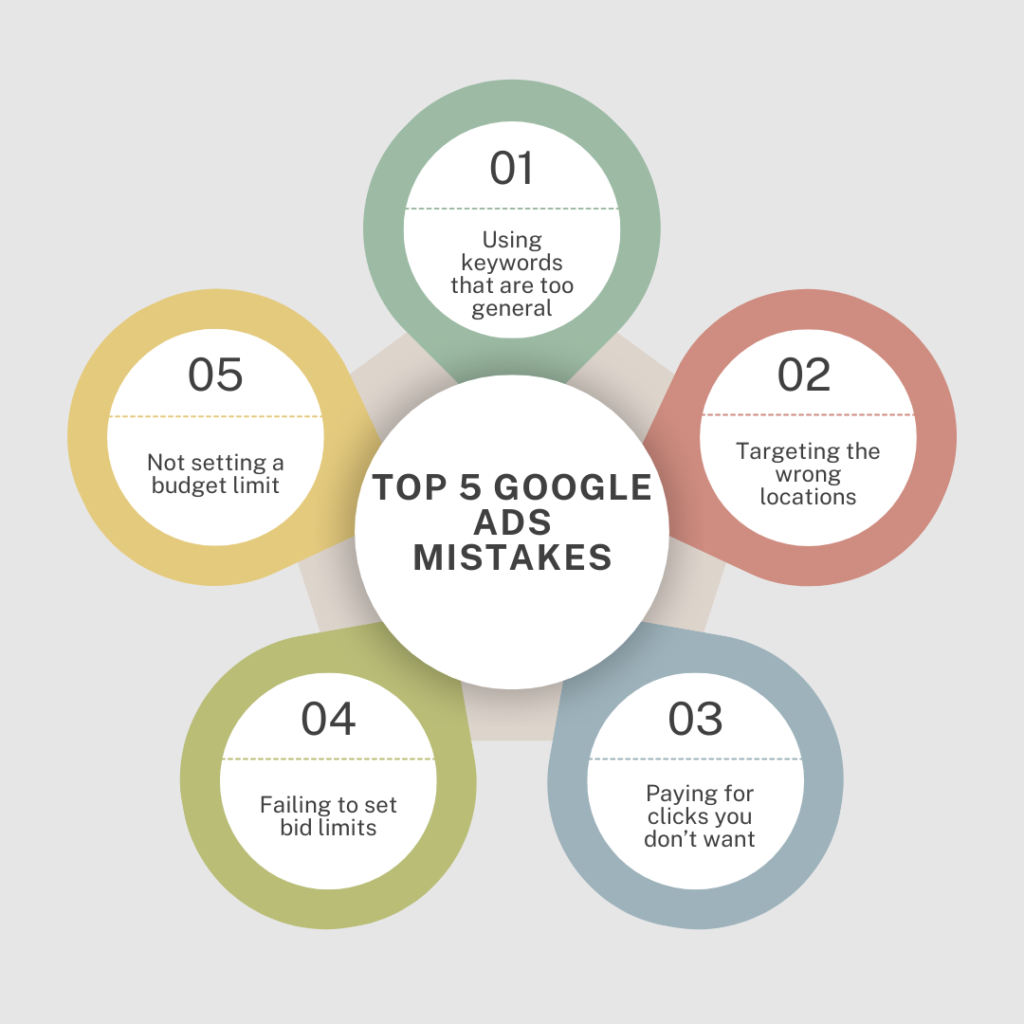Why Google Ads Can Be Great For Your Business …
Did you know that, on average over 60% of Google Ad spend is wasted on keywords that never converted (Why Google Ads Accounts Succeed and Fail [DATA])?
It should come as no surprise that Google dominates the search engine market, capturing over 90% of global search traffic. By using Google Ads to market your business, you tap into a vast audience actively searching for the products and services you offer. Unlike traditional TV, radio, or social media ads which rely on capturing (or interrupting) the attention of people who are on these platforms for entertainment or social engagement. Google Ads, on the other hand, target users who are actively searching for the very things being advertised, making them a powerful tool for driving traffic to your website and increasing leads, sales, and profits.
Common Google Ads Mistakes That Can Drain Your Budget
Despite its potential, many businesses make costly mistakes when setting up Google Ads that can quickly exhaust their budget
In this article, we’ll discuss the 5 most common mistakes businesses make when setting up Google Ads and how you can avoid them to ensure your budget delivers the best possible return on investment.
- Using Keywords That Are Too General
Google’s default broad match keywords aim to reach the largest possible audience without you having to create an extensive keyword list. But this higher traffic reach is less targeted which means your ads may show up for searches that are not directly relevant to your offering. For example, an ad for an auto repair shop using broad match keywords like “break repair” might show up for someone searching for “break repair instructions”, which is not ideal. Broad match keywords can drain funds quickly for businesses operating on a tight budget.
Google’s exact match keywords restrict your ads to show only when someone searches for your exact phrase. This will result in the highest relevance and higher conversions since traffic will be highly targeted. But this will also mean fewer impressions and clicks.
Phrase match keywords provide a middle ground that provides a balance of reach and relevance. They allow your ads to appear when someone searches for your keyword or a close variation of it. For example, an ad using the phrase match keyword “auto repair” could be presented for searches like “affordable auto repair services”, or “ auto repair near me”. For this reason, phrase match or a combination of phrase match and exact match keywords are usually the best option for most businesses.
- Targeting the Wrong Locations
When setting up your Google Ad campaign, the default setting is “All countries and territories”, which means your ad will be shown globally. Unless you intend to target a global audience, you’ll want to narrow your targeting to avoid wasting money, especially if you’re on a limited budget.
For businesses like car repair shops, restaurants, or hair salons, your potential customers are likely within a 20 mile radius. So having your ads appear outside of this area will draw less targeted and relevant traffic wasting your budget. Google makes it possible to narrow your campaign’s target location by country, city, region, and even postal code ensuring you reach the most relevant audience.
- Paying For Clicks You Don’t Want
Unwanted clicks, or irrelevant traffic to your site, can occur for several reasons including several that I discussed above such as poor location targeting and the use of broad match keywords. As I mentioned in the section “Using Keywords That Are Too General”, using broad match keywords will bring in more visitors, but the traffic will be less relevant resulting in lower conversion rates. Phrase match keywords are usually the best choice for most businesses, but its not perfect. Google’s algorithm will still try to interpret search intent, which will occasionally result in showing your ad for searches that are not a match for what you’re offering. Since it’s impossible to anticipate every irrelevant search term, you’ll need to monitor your campaign regularly to update your negative keyword list to avoid paying for clicks you don’t want.
- Failing To Set Bid Limits
A bid refers to the amount you pay each time someone clicks on your ad. Without bid limits, Google may bid higher amounts to secure higher placements for your ads. This can increase your cost-per-click (CPC) and quickly deplete your budget. Setting bid limits will ensure that you know exactly how much you’re paying for each click giving you more control on how your ad budget is being spent.
- Not Setting a Budget Limit
This is similar to the mistake of not setting bid limits except that it refers to your overall budget. Taking the information you’ve already learned, imagine if your campaign was configured to use broad match keywords and your ad is being presented around the world. Now imagine the same scenario if you never set a budget limit. Needless to say, your costs can quickly spiral out of control so it’s critical that you cap your budget spend. In the worst case scenario that you make some of the mistakes I’m describing in this article, setting a budget limit will limit the damage.
Conclusion: Maximize Your Google Ads Budget for Success
The great thing about Google Ads is that you’re guaranteed new traffic since you only pay when someone clicks on your ad. If you pay for 1,000 clicks per month, you’re assured to get 1,000 visitors to your site. But attracting traffic alone is not enough. Turning that traffic into leads or sales will require targeting the right audience and leading them to landing pages that perform well and provide value.
FAQs
What are the most common mistakes in Google Ads campaigns?
The most common mistakes in Google Ads campaigns include poor keyword selection, neglecting ad extensions, failing to segment campaigns, setting inadequate budgets, failing to target by location, and not utilizing negative keywords to filter out irrelevant traffic.
What are common bidding mistakes in Google Ads campaigns?
Common bidding mistakes in Google Ads campaigns include setting bids too low, ignoring bid adjustments for factors like device and location, failing to monitor performance regularly, and not utilizing automated bidding strategies effectively.
Why is it important to track conversions properly?
Failing to track conversions properly means you have no way of measuring the effectiveness of your campaign which can result in wasted budget dollars and missed opportunities.
What indicators signal a Google Ads mistake?
Some common indications that your Google Ads campaign may be misconfigured are an unusually high CPC, low click-through rates, irrelevant keywords, and a poor conversion rate. It’s important to monitor these metrics regularly to quickly identify areas that need adjustment to ensure effective campaign performance.
What strategies minimize Google Ads deployment errors?
Strategies to minimize Google Ads deployment errors include thorough keyword research, careful campaign structure, regular performance monitoring, using automated rules, and conducting A/B testing to identify issues before full-scale launch.
A Step-by-Step Guide to Optimizing Your Google Ads
To help you make sure your campaigns avoid the mistakes described in this article, I’ve put together a free downloadable guide that will walk you through step-by-step instructions on how to configure many of the settings discussed in this article such as refining keyword match types, adjusting location targeting, setting bid and budget limits, creating negative keyword lists, and optimizing for mobile.




